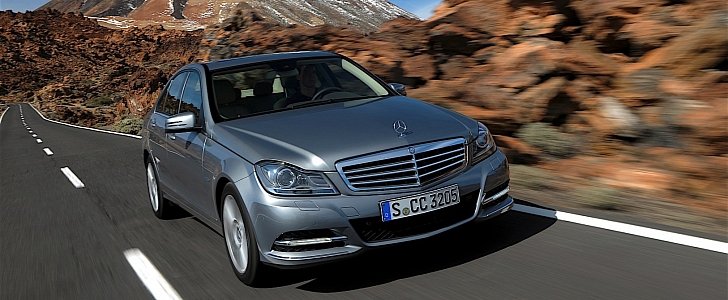Back in September when the Volkswagen emission rigging scandal broke out, the unanimous decision was that more heads were to fall in the following months. Everybody thought that it was impossible for the VW Group to be alone in this, and yet no other culprit had been found since.
But it’s not for the lack of trying. The first allegations targeted BMW and their X3 compact SUV with a 2.0-liter diesel engine, but they proved to be unfounded, and the matter was quickly dropped.
These days, though, an independent body set its sights on Daimler AG and its Mercedes-Benz brand, saying one of its older diesel-engined cars wasn’t up to the claimed emission standards of its time.
The vehicle in case is a 2011 (W204) Mercedes-Benz C200 CDI that uses a 2,143cc (131 cu in) four-cylinder turbo-diesel engine developing 136 hp and 330 Nm (243 lb-ft). An independent group from Germany called DUH quoted tests carried out by the University of Applied Sciences in Bern, Switzerland, which checked whether the car’s real-world emission figures matched those stated by the manufacturer. The result wasn’t a positive one.
Calling DUH “independent” is a little far-fetched, as it is, after all, an environmental lobby group, so while its overall intentions might be in the society’s interest, it may also be more than a little biased.
Meanwhile, Mercedes-Benz issued a press release that presents the German car maker’s side of the story, and it does make some valid points. First of all, Mercedes states the obvious by saying that a four-year-old car will naturally not function within the same parameters as a brand new one.
Second, Daimler claims that it is also normal for a real-world test to yield different results than one carried out in a laboratory, as there are countless other variables that don’t make their way into the sterile conditions of a lab. It also claims that the Bern University did not make clear the conditions under which the tests were carried out, despite a formal request on Daimler’s part. The technical condition of the tested vehicle or its history weren’t clarified either.
The engine fit into the 2011 C200 CDI was introduced in 2008 and received its certification in 2007, which meant it needed to be Euro 5 compliant. Daimler clearly states that all of its engines meet the requirements of the European emission tests, stressing that none of them use defeat devices that alter the exhaust gas after treatment or that recognize when the car is being tested.
Furthermore, Mercedes-Benz reminds everyone that it has been an active supporter of the Worldwide Harmonized Light Vehicles Test Procedure (WHLTP), as well as the push to measure Real Driving Emissions (RDE).
The press release ends with the logical reaction from anybody whose image might be tainted by false accusations: “We would like to point out that we reserve the right to take legal action at any time if false allegations or unjustified accusations should damage our company’s image or reputation.”
Let’s sit back and see how this pans out.
These days, though, an independent body set its sights on Daimler AG and its Mercedes-Benz brand, saying one of its older diesel-engined cars wasn’t up to the claimed emission standards of its time.
The vehicle in case is a 2011 (W204) Mercedes-Benz C200 CDI that uses a 2,143cc (131 cu in) four-cylinder turbo-diesel engine developing 136 hp and 330 Nm (243 lb-ft). An independent group from Germany called DUH quoted tests carried out by the University of Applied Sciences in Bern, Switzerland, which checked whether the car’s real-world emission figures matched those stated by the manufacturer. The result wasn’t a positive one.
Calling DUH “independent” is a little far-fetched, as it is, after all, an environmental lobby group, so while its overall intentions might be in the society’s interest, it may also be more than a little biased.
Meanwhile, Mercedes-Benz issued a press release that presents the German car maker’s side of the story, and it does make some valid points. First of all, Mercedes states the obvious by saying that a four-year-old car will naturally not function within the same parameters as a brand new one.
Second, Daimler claims that it is also normal for a real-world test to yield different results than one carried out in a laboratory, as there are countless other variables that don’t make their way into the sterile conditions of a lab. It also claims that the Bern University did not make clear the conditions under which the tests were carried out, despite a formal request on Daimler’s part. The technical condition of the tested vehicle or its history weren’t clarified either.
The engine fit into the 2011 C200 CDI was introduced in 2008 and received its certification in 2007, which meant it needed to be Euro 5 compliant. Daimler clearly states that all of its engines meet the requirements of the European emission tests, stressing that none of them use defeat devices that alter the exhaust gas after treatment or that recognize when the car is being tested.
Furthermore, Mercedes-Benz reminds everyone that it has been an active supporter of the Worldwide Harmonized Light Vehicles Test Procedure (WHLTP), as well as the push to measure Real Driving Emissions (RDE).
The press release ends with the logical reaction from anybody whose image might be tainted by false accusations: “We would like to point out that we reserve the right to take legal action at any time if false allegations or unjustified accusations should damage our company’s image or reputation.”
Let’s sit back and see how this pans out.

